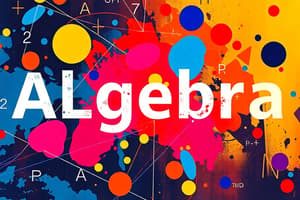Podcast
Questions and Answers
What concept is introduced in prealgebra for expressing numbers accurately up to two decimal places?
What concept is introduced in prealgebra for expressing numbers accurately up to two decimal places?
- Fraction arithmetic
- Decimal arithmetic (correct)
- Variable arithmetic
- Integer arithmetic
In mathematics, what do variables represent?
In mathematics, what do variables represent?
- Known quantities
- Unknown or changing quantities (correct)
- Fixed quantities
- Constants
What does simplifying fractions down to their prime factors help in doing?
What does simplifying fractions down to their prime factors help in doing?
- Adding fractions
- Dividing fractions
- Comparing fractions (correct)
- Multiplying fractions
What kind of numbers are represented by continuous variables in mathematics?
What kind of numbers are represented by continuous variables in mathematics?
Which arithmetic operation is NOT typically introduced in prealgebra?
Which arithmetic operation is NOT typically introduced in prealgebra?
What is the result of $10 - 3 \times 2$?
What is the result of $10 - 3 \times 2$?
Which of the following is an integer?
Which of the following is an integer?
What is $\dfrac{3}{4} + \dfrac{1}{2}$ expressed as a single fraction?
What is $\dfrac{3}{4} + \dfrac{1}{2}$ expressed as a single fraction?
Which of the following is a decimal number?
Which of the following is a decimal number?
In the expression $4x - 2 = 10$, what is the value of $x$?
In the expression $4x - 2 = 10$, what is the value of $x$?
What is the result of $50 \div (10 - 2 \times 4)$?
What is the result of $50 \div (10 - 2 \times 4)$?
Flashcards are hidden until you start studying
Study Notes
Prealgebra: Basics and Building Blocks
Prealgebra is a foundational course designed to help students prepare for more advanced math courses like algebra. It covers fundamental concepts such as order of operations, which dictates how we perform arithmetic with different types of expressions; understanding integers, including positive and negative numbers; manipulating common denominators for simplification of fractions; working with decimals using place value; and recognizing and representing unknown values using variables. These are essential skills that set the stage for deeper explorations into the world of mathematics.
Order of Operations
The order of operations specifies the sequence of operations to follow when calculating complex mathematical expressions involving addition, multiplication, division, and exponentiation. This rule ensures that every expression has only one correct answer regardless of whether it's evaluated left to right or right to left. For example, if you have (7 + 8 \times 6), the order of operations dictate that you first calculate the product within the parentheses ((8 \times 6 = 48)), then add this result to the original number in the expression ((7 + 48 = 55)).
Integers, Fractions, Decimals
In prealgebra, students learn about integer arithmetic, where they work with both positive and negative whole numbers. They also encounter fraction arithmetic, learning how to multiply, divide, and compare fractions by finding their lowest or highest form through simplifying them down to their prime factors. Lastly, prealgebra introduces decimal arithmetic, showing how to round off numbers and express them accurately up to two places after the decimal point.
Variables
Variables represent unknown or changing quantities in a mathematical context. There are three main kinds of variable used in most classes of mathematics - continuous, discrete, and symbolic. Students often begin their study of this concept with letters from the alphabet, like 'x', 'y', or any other letter of choice, which can take on various numerical values depending upon the problem being solved. Understanding how these variables behave helps lay the groundwork for future studies in algebra, geometry, trigonometry, and even calculus.
Studying That Suits You
Use AI to generate personalized quizzes and flashcards to suit your learning preferences.




